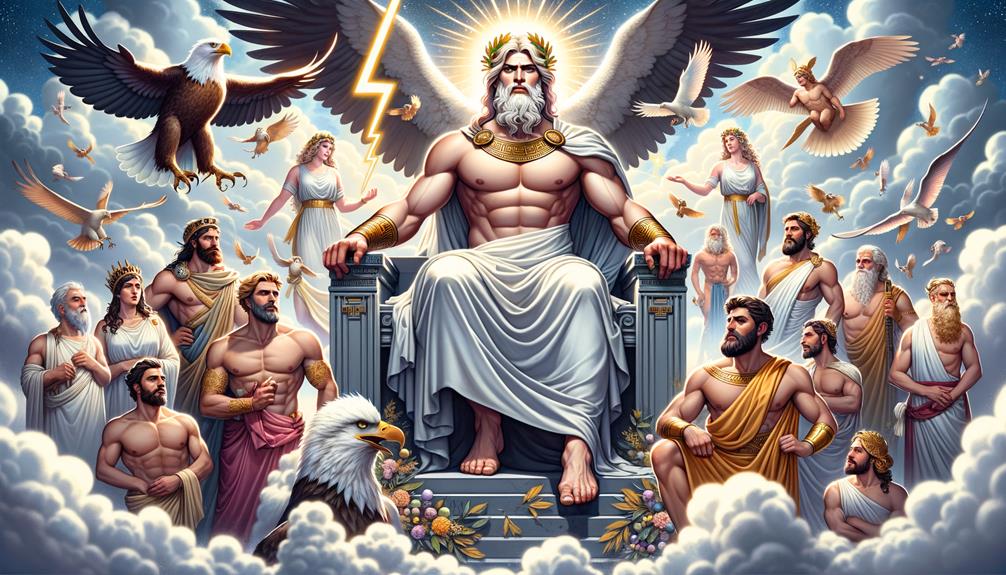Got a moment to talk about Zeus? He’s no ordinary deity – he’s the undisputed king of Greek gods, ruling with grandeur from his throne atop Mount Olympus. Zeus has a knack for controlling the weather – he’s the one behind those rumbling thunderstorms and flashy lightning.
After leading the charge against the Titans, he established a fresh legion of deities, cementing his status as a game-changer. And talk about having a big family – Zeus is dad to a whole host of gods, heroes, and even some mortals, which speaks volumes about his all-encompassing power.
You’ve probably seen some of the symbols associated with Zeus. The thunderbolt and the eagle, for instance, are a testament to his supreme authority. And then there’s his oak and royal sceptre – they’re physical representations of his strength and regality.
You’ll see traces of Zeus in our everyday culture, too. He’s a popular figure in literature and art, a testament to his lasting impact. The more you learn about Zeus, the more you’ll marvel at the dynamism of his reign.
Zeus’ Role in Greek Mythology
If we take a closer look at Zeus’s part in Greek mythology, we’ll see that he was the big boss – the king of all the Greek gods. As the ruler of Mount Olympus, he had the power to control the weather, with thunderstorms, rain, and lightning being his specialties. His trademark thunderbolt was a big deal, feared by both humans and gods alike.
Now, Zeus didn’t just sit on his throne all day. He had a knack for strategy and a strong will, which came in handy when he took down the Titans. These guys were the old rulers before the Olympian Gods took over. So, by defeating them, Zeus showed off his leadership skills and set up a new order in the cosmos.
Apart from ruling, Zeus also had a ton of kids – gods, goddesses, and heroes. These offspring had a big part to play in Greek mythology. You had warriors like Hercules and the goddess of wisdom, Athena, just to name a couple.
Back in the day, the people of ancient Greece had a lot of respect for Zeus. There were tons of festivals and sacrifices in his honor. These rituals were a way for the Greeks to acknowledge Zeus’s power and celebrate his role in their mythology.
Symbols Associated With Zeus
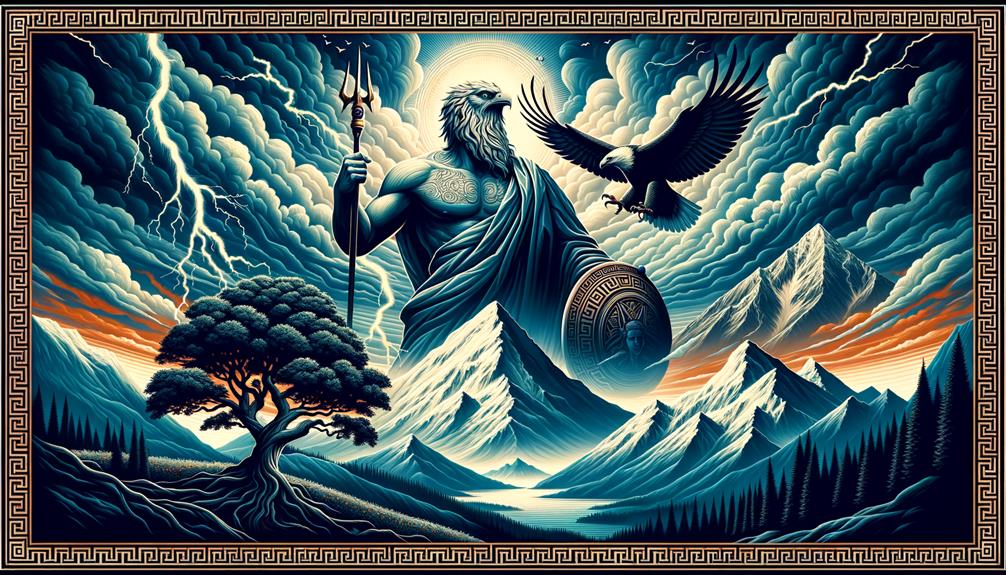
Now, let’s chat about Zeus and the symbols that represent him. You can’t talk about ancient Greek culture without mentioning Zeus, the big boss of the gods. He’s got a bunch of symbols that portray different aspects of his godly character.
- Thunderbolt: When you think of Zeus, the first thing that probably comes to mind is his thunderbolt. It’s like his superhero logo! The thunderbolt symbolizes his control over the sky and weather. And fun fact, places that get hit by lightning – which is often shown as Zeus’s thunderbolt – are considered sacred.
- Eagle: Next up is the eagle. This bird of prey, known for its sharp vision and high-flying ways, represents Zeus’s supervision and control over the world.
- Oak Tree: The mighty oak tree is also linked to Zeus. It stands for his strength and staying power, and also highlights the sanctity of nature under his care.
- Royal Sceptre: And of course, there’s the royal sceptre. It’s like a badge of office, showing that he’s the king of the gods.
These symbols, which are deeply rooted in ancient Greek culture, give us a fascinating insight into the layered personality of Zeus, the god of the sky in Greek mythology.
Zeus’ Family and Offspring
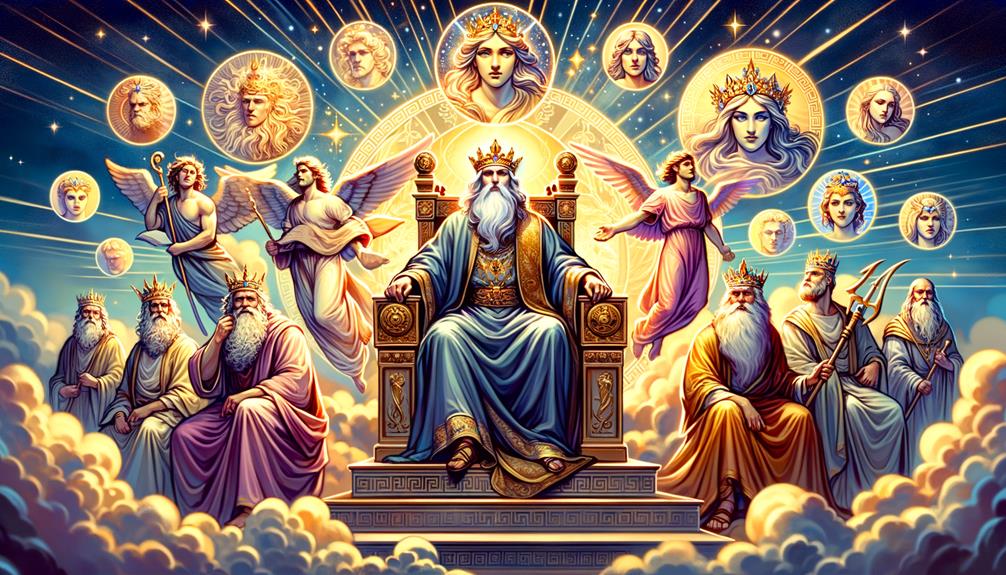
Zeus, known as the supreme god in ancient Greek mythology, had a family life that was as captivating as it was chaotic. His relationships were a blend of heavenly marriages and infamous affairs, making his lineage quite a topic of interest.
He was the offspring of Cronus, who, in fear of being overthrown by one of his kids as prophesied, swallowed each child as they were born. Ingeniously, when Zeus was born, his mother Rhea tricked Cronus into swallowing a stone wrapped in baby clothes, and Zeus was safely hidden. As destiny would have it, Zeus later overthrew Cronus, proving the prophecy true.
Zeus was wed to Hera, his sister, and they had a number of children, including renowned figures like Athena, Apollo, Artemis, and Hercules. Yet, Zeus wasn’t exactly a one-woman deity. His numerous romances, with both mortal and immortal women, resulted in a host of children. His knack for metamorphosing into animals certainly made these escapades easier.
This intricate family setup, brimming with rivalries and conflicts, offers a compelling insight into Zeus’s personal life and makes the exploration of his descendants all the more riveting.
Ancient Worship of Zeus
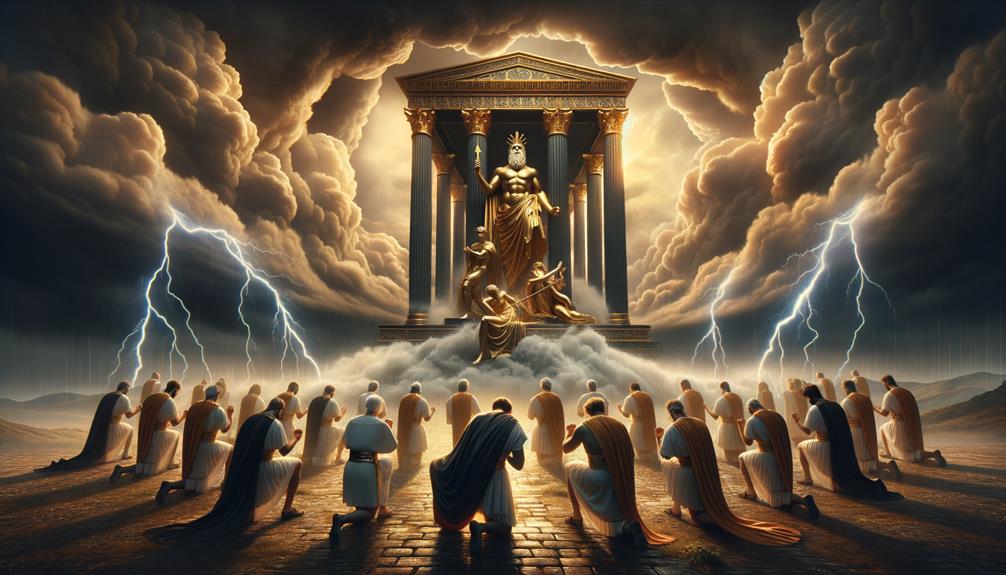
In the ancient times, Greeks viewed Zeus not just as a god, but also as a mighty ruler of the sky and weather. This influence and authority were symbolized by his signature weapon – the thunderbolt. This reflected his control over the skies and his position as the head honcho among Greek gods.
Interestingly enough, the worship of Zeus shares some striking similarities with Roman practices. Zeus and the Roman god Jupiter were essentially the same deity. Both were viewed as the top dogs in their respective cultures, and their worship involved similar traditions and offerings.
Zeus’s early life is a fascinating tale and a vital part of Greek mythology. His father, Cronus, who feared being overthrown by one of his children, swallowed them. However, Zeus’s mother, Rhea, cunningly saved baby Zeus. She tricked Cronus by giving him a stone wrapped in baby clothes to swallow, ensuring Zeus’s survival and his eventual rise to the throne of the gods.
If we wanted to break down the ancient worship of Zeus into four main points, it would look something like this:
- Zeus’s authority was a big deal in every aspect of Greek life.
- When it comes to worship, Zeus and Jupiter of the Romans were pretty much the same deal.
- The story of Zeus’s early life plays a key role in his worship.
- His dominance was recognized through sacrifices, prayers, and rituals.
Just goes to show how fascinating and complex ancient mythology can be, right?
Zeus’s Influence on Modern Culture
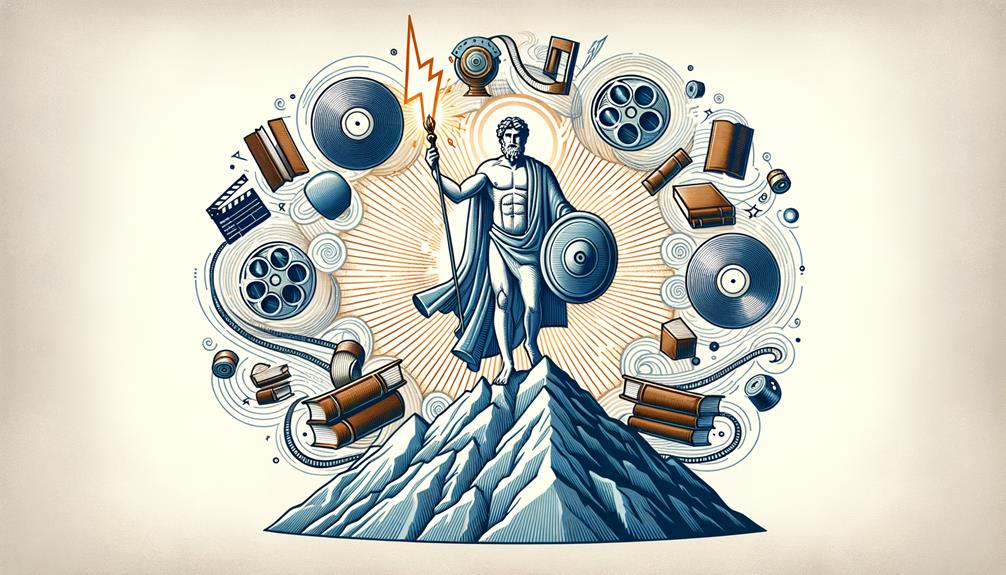
Let’s chat about how Zeus, the god of the sky and weather from ancient mythology, has made his mark on our modern culture. You’ll find traces of Zeus in literature, art, and even our media. You know how we often portray our leaders as strong and powerful? Well, Zeus was known as the protector of cities, so that’s probably where we get it from!
Remember the story where Zeus outsmarts the king of the Titans, Kronos, with a swaddled stone? This kind of clever trickery has become a staple in our storytelling. And let’s not forget about thunder and lightning, Zeus’s signature elements. These have become universal symbols of power and the divine. Think about how often you see a thunderbolt used to represent ultimate power.
Zeus’s influence doesn’t stop there. When Athena sprang from his head, Zeus cemented his status as the original source of the Olympian Gods. This has inspired modern stories to feature patriarchal figures, echoing Zeus’s influence. And of course, Zeus’s image graces modern art, with paintings and sculptures capturing his grandeur.
Frequently Asked Questions
What Was Zeus Known For?
If you were to ask me, “Hey, what’s Zeus famous for?” I’d tell you straight up that this guy was the big boss of the sky. He was all about controlling thunder and lightning, like some ancient superhero. But he wasn’t just about the flashy stuff. He also had a soft spot for the underdogs – the strangers, the guests, and the marginalized folks. He was their guardian, their protector. Pretty cool, right?
What Is Zeus’s True Form?
Let’s chat about Zeus, the big guy in Greek mythology. Picture a strong, older man with a beard – that’s the traditional depiction of Zeus. Often, he’s shown wearing a robe and holding a thunderbolt, which is a pretty clear sign of his divine power and supremacy. Pretty impressive, right?
What Are 5 Interesting Facts About Zeus?
Here are a few fascinating tidbits about Zeus! Firstly, his parents were no ordinary folk – they were the Titans Kronos and Rheia. Next, he showed some serious power by toppling the Titans from their reign. He also made his home on the majestic Mount Olympus, from where he rules. Talk about a home with a view! Ever see a lightning bolt in a storm? That’s Zeus’s weapon of choice! He’s also a symbol of justice – quite a responsibility, wouldn’t you say? Lastly, if you’re ever trying to spot signs of Zeus, keep an eye out for an eagle or an oak – those are his symbols.
Who Is Most Powerful Than Zeus?
If we’re talking about who’s stronger than Zeus, there are a few beings that come to mind. For starters, there are the ancient deities Uranus and Gaia, who were the original gods even before Zeus came into the picture. Then there’s the Fates, who have the power to control destiny, which is a pretty significant edge. You could also look at some of the Titans, like Oceanus and Hyperion, who were historically renowned for their might. Even Typhon, the legendary monster, had power that surpassed that of Zeus. So, while Zeus is impressive, there are still those who outdo him in terms of power.

